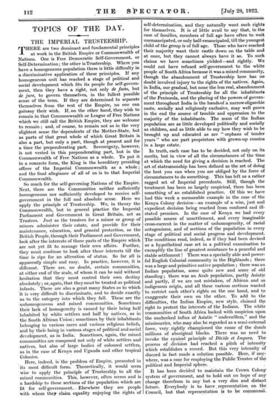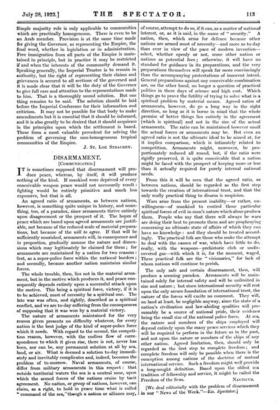TOPICS OF THE DAY.
THE IMPERIAL TRUSTEESHIP.
THERE are two dominant and fundamental principles at work in the British Empire or Commonwealth of Nations. One is Free Democratic Self-Government, or Self-Determination; the other is Trusteeship. Where you have a homogeneous population there is little difficulty in a discriminative application of these principles. If any homogeneous unit has reached a stage of political and social development which fits its people for self-govern- ment, then they have a right, not only de facto, but de jure, to govern themselves, in the fullest possible sense of the term. If they are determined to separate themselves from the rest of the Empire, no one can gainsay their wish. If, on the other hand, they wish to remain in that Commonwealth or League of Free Nations which we still call the British Empire, they are welcome to remain ; and, of course, to remain not as in the very slightest sense the dependents of the Mother-State, but as parts of that great whole of which Great Britain is also a part, but only a part, though at present and for a time the preponderating part. Sovereignty, however, is not vested in this preponderating part, but in the Commonwealth of Free Nations as a whole. To put it in a concrete form, the King is the hereditary presiding officer of the Imperial Commonwealth as a whole ; and the final allegiance of all of us is to that Imperial Commonwealth.
So much for the self-governing Nations of the Empire. Next, there are the Communities neither sufficiently homogeneous nor sufficiently developed to receive self- government in the full and absolute sense. Here we apply the principle of Trusteeship. We, in theory the Commonwealth, but in general piactice the Imperial Parliament and Government in Great Britain, act as -Trustees. Just as the trustees for a minor or group of minors administer their estate, and provide for their maintenance, education, and geneial protection, so the British People, through their Parliament and Government, look after the interests of those parts of the Empire which are not yet fit to manage their own affairs. Further, they must continue to look after those interests till the time is ripe for, an alteration of status. So far all is apparently simple and easy. In practice, however, it is different. There are, no doubt, certain communities, at either end of the scale, of whom it can be said without hesitation that they must control their own destiny absolutely ; or, again, that they must be treated as political _ infants. There are also a great many States as to which it is very difficult to discriminate, and to decide exactly as to the category into which they fall. These are the unhomogeneous and mixed communities. Sometimes their lack of homogeneity is caused by their being half inhabited by white settlers and half by natives, as in the South African Union ; sometimes by their inhabitants belonging to various races and various religious beliefs, and by their being in various stages of political and social development, as in India. Sometimes, again, the mixed Communities are composed not only of white settlers and natives, but also of large bodies of coloured settlers, as in the case of Kenya and Uganda and other tropical Colonies.
Here, indeed, is the problem of Empire, presented in its most difficult form. Theoretically, it would seem wise to apply the principle of Trusteeship, to all the mixed communities. This, however, often seems and is a hardship to those sections of the population which are fit for self-government... Elsewhere they see people with whom they claim equality enjoying the rights of self-determination, and they naturally want such rights for, themselves. It is of little avail to say that, in the case of families, members of full age have often to .wait unemancipated, or only half-emancipated, till the youngest child of the group is of full age. Those who have reached their majority want their castle down on the table and at once, but they cannot always have it so. To .such claims we have sometimes yielded—and rightly. We could not have refused self-government to the white people of South Africa because it was a mixed community, though the abandonment of Trusteeship here has no doubt involved injury to the rights of the natives. Again, in India, our gradual, but none the less real, abandonment of the principle of Trusteeship for all the inhabitants of the Peninsula, and the placing of the powers of govern- ment throughout India in the hands of a narrow oligarchic caste, socially and religiously exclusive, may well prove in the end the source of trouble and oppression to the majority of the inhabitants. The mass of the Indian population are as little developed politically and socially as children, and as little able to say how they wish to be brought up and educated as are " orphans of tender years " who are part proprietors with grown-up cousins in a large estate.
In truth, each case has to be decided, not only on its merits, but in view of all the circumstances of the time at which the need for giving a decision is reached. The art of statesmanship has been defined as the art of doing the best you can when you are obliged by the force of circumstances to do. something. This has left us a rather ragged set of Imperial precedents. Still, though the treatment has been so largely empirical, there has been something of an established practice. Of this we have had this week a memorable example in the case of the Kenya Colony decision—an example of a wise, just and expedient decision being reached from confused and ill- stated premises. In the case of Kenya we had every possible source of unsettlement, and every imaginable cross-current in the matter of unhomogeneity, of racial antagonisms, and of sections. of the population in every stage of political and social progress and development. The conditions read, indeed, as if they had been devised as a hypothetical case set in a political examination to exemplify the line of greatest resistance to a peaceful and stable settlement ! There was a specially able and power- ful English Colonial community in the Highlands ; there was a large and primitive native population ; there was an Indian population, some quite new and some of old standing • there was an Arab population, partly Asiatic and partly, if we are not mistaken, of African and so indigenous origin, and all these various sections wanted to restrict each other's rights on the one hand, and to exaggerate their own on the other. To , add to the difficulties, the Indian Empire, new style, claimed the right to protect the interests of the Indians. The white communities of South Africa looked with suspicion upon the unchecked influx of Asiatic " undersellers," and the missionaries, who may also be regarded as a semi-external force, very. rightly championed the cause of the dumb millions of, aboriginal blacks. There was no need to invoke the cynical pi inciple of Divide et Impera. The process of . division had reached a pitch of intensity which establishes a record. But this very intensity of discord in fact made a solution possible. Here, if any- where, was a case for employing the Public Trustee of the political and Imperial sphere.
It has been decided to maintain the Crown Colony system of government, and to hold out no hope of any change therefrom in any but a very dim and distant future. Everybody is to have representation on the Council, but that representation is to be communal. Simple majority rule is only applicable to communities Which are practically homogeneous. There is even to be an Arab member. Provision is at the same time made for giving the Governor, as representing the Empire, the final word, whether in legislation or in administration. Free immigration from all parts of the EMpire is main- tained in principle, but in practice it may be restricted if and when the interests of the community demand it. Speaking generally, the Imperial Trustee is to remain in authority, but the right of representing their claims and grievances is secured to all sections of the governed and it is made clear that it will be the duty of the Governor to give full care and attention to the representations made to him. That is a thoroughly sound solution. But one thing remains to be said. ' The solution should be laid before the Imperial Conference for their information and criticism. It may not be possible for that body to make amendments but it is essential that it should be informed, and it is also greatly to be desired that it should acquiesce in the principles upon which the settlement is based. These form a most valuable precedent for solving the problem of governing the non-homogeneous tropical communities of the Empire. J. ST. LOE STRACHEY.







































 Previous page
Previous page